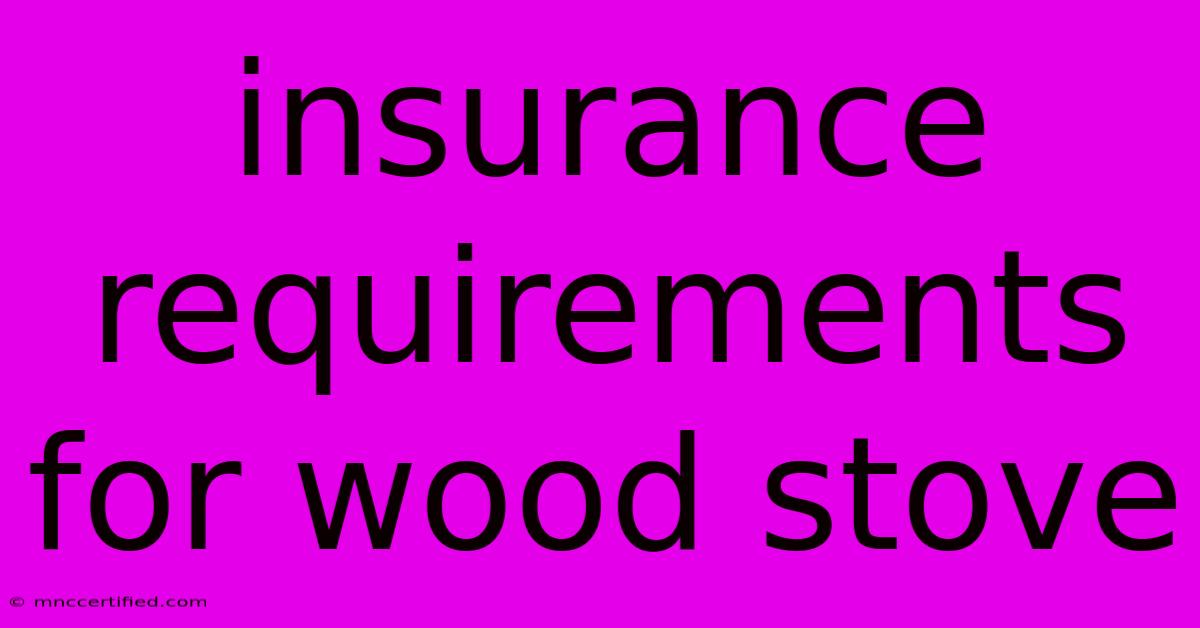Insurance Requirements For Wood Stove

Table of Contents
Keep Warm and Safe: Understanding Insurance Requirements for Wood Stoves
Winter is coming, and for many, that means cozy nights by a crackling wood stove. But before you start stacking logs, it's important to understand the insurance requirements that come with owning a wood stove.
Why are Insurance Requirements Important?
Wood stoves, while providing warmth and ambiance, also pose certain risks:
- Fire Hazards: Improper installation, maintenance, or use can lead to chimney fires, house fires, or even injuries.
- Liability: Accidents can happen, and if your stove causes damage to your property or someone else's, you could be held liable.
Understanding Your Policy:
The first step is to review your homeowner's or renter's insurance policy. Look for these key elements:
- Coverage for Wood Stoves: Ensure your policy specifically covers wood stoves. Some policies may have exclusions or limitations.
- Chimney Inspections: Find out if your insurer requires regular chimney inspections. These are crucial for maintaining safety and preventing fires.
- Installation Standards: Check if your policy specifies any installation standards you need to meet. This may include using certified installers and following local building codes.
Common Insurance Requirements for Wood Stoves:
- Professional Installation: Most insurers require that your wood stove be installed by a qualified, licensed professional. This ensures proper installation, preventing potential hazards.
- Chimney Inspections: Annual or biannual chimney inspections by a certified inspector are often mandatory. This ensures your chimney is in good working order and free of blockages.
- Fire Extinguishers: Having a fire extinguisher specifically designed for wood stove fires is usually a requirement. This provides immediate action in case of a fire.
- Smoke Detectors: Working smoke detectors are essential for any home, but insurers may have specific requirements about location and type.
- Clearance: Your stove must be installed with proper clearance from walls and combustible materials. This prevents accidental fires.
Preventing Problems and Protecting Your Coverage:
- Regular Maintenance: Clean your stove and chimney regularly to prevent creosote buildup, which can cause fires.
- Proper Operation: Follow the manufacturer's instructions for operating your stove safely.
- Responsible Fuel: Use only dry, seasoned wood and avoid using flammable liquids to start fires.
- Supervision: Never leave a wood stove unattended, especially when children are present.
Talk to Your Insurance Agent:
Don't hesitate to discuss your specific situation with your insurance agent. They can provide you with personalized advice and ensure your policy meets your needs.
By taking these steps, you can enjoy the warmth and charm of a wood stove while minimizing risks and protecting yourself financially.

Thank you for visiting our website wich cover about Insurance Requirements For Wood Stove. We hope the information provided has been useful to you. Feel free to contact us if you have any questions or need further assistance. See you next time and dont miss to bookmark.
Featured Posts
-
The American Worker Insurance Doctors
Nov 10, 2024
-
India Targets 2036 Olympics Global Image Goals
Nov 10, 2024
-
Gekko Hq Crypto Price Prediction 2030
Nov 10, 2024
-
Mercury Insurance Rental Car Coverage
Nov 10, 2024
-
Zheng Loses To Gauff In Wta Finals
Nov 10, 2024